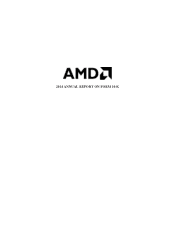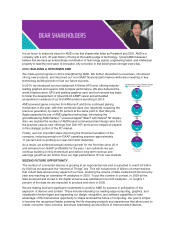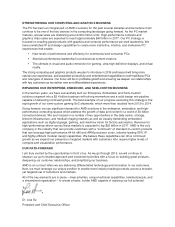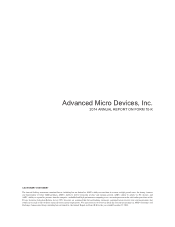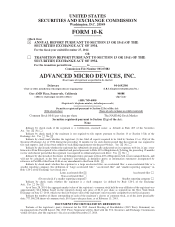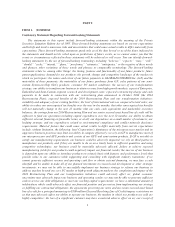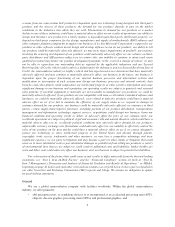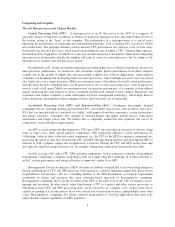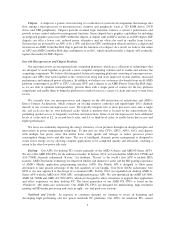AMD 2014 Annual Report Download - page 8
Download and view the complete annual report
Please find page 8 of the 2014 AMD annual report below. You can navigate through the pages in the report by either clicking on the pages listed below, or by using the keyword search tool below to find specific information within the annual report.revenue from our semi-custom SoC products is dependent upon our technology being designed into third-party
products and the success of those products; the demand for our products depends in part on the market
conditions in the industries into which they are sold. Fluctuations in demand for our products or a market
decline in any of these industries could have a material adverse effect on our results of operations; our ability to
design and introduce new products in a timely manner is dependent upon third-party intellectual property; we
depend on third-party companies for the design, manufacture and supply of motherboards, BIOS software and
other computer platform components to support our business; if we lose Microsoft Corporation’s support for our
products or other software vendors do not design and develop software to run on our products, our ability to sell
our products could be materially adversely affected; we may incur future impairments of goodwill; uncertainties
involving the ordering and shipment of our products could materially adversely affect us; our reliance on third-
party distributors and AIB partners subjects us to certain risks; our inability to continue to attract and retain
qualified personnel may hinder our product development programs; in the event of a change of control, we may
not be able to repurchase our outstanding debt as required by the applicable indentures and our Secured
Revolving Line of Credit, which would result in a default under the indentures and our Secured Revolving Line of
Credit; the semiconductor industry is highly cyclical and has experienced severe downturns that have materially
adversely affected, and may continue to materially adversely affect, our business in the future; our business is
dependent upon the proper functioning of our internal business processes and information systems and
modification or interruption of such systems may disrupt our business, processes and internal controls; data
breaches and cyber-attacks could compromise our intellectual property or other sensitive information and cause
significant damage to our business and reputation; our operating results are subject to quarterly and seasonal
sales patterns; if essential equipment or materials are not available to manufacture our products, we could be
materially adversely affected; if our products are not compatible with some or all industry-standard software and
hardware, we could be materially adversely affected; costs related to defective products could have a material
adverse effect on us; if we fail to maintain the efficiency of our supply chain as we respond to changes in
customer demand for our products, our business could be materially adversely affected; we outsource to third
parties certain supply-chain logistics functions, including portions of our product distribution, transportation
management and information technology support services; acquisitions could disrupt our business, harm our
financial condition and operating results or dilute, or adversely affect the price of, our common stock; our
worldwide operations are subject to political, legal and economic risks and natural disasters, which could have a
material adverse effect on us; worldwide political conditions may adversely affect demand for our products;
unfavorable currency exchange rate fluctuations could adversely affect us; our inability to effectively control the
sales of our products on the gray market could have a material adverse effect on us; if we cannot adequately
protect our technology or other intellectual property in the United States and abroad, through patents,
copyrights, trade secrets, trademarks and other measures, we may lose a competitive advantage and incur
significant expenses; we are party to litigation and may become a party to other claims or litigation that could
cause us to incur substantial costs or pay substantial damages or prohibit us from selling our products; a variety
of environmental laws that we are subject to could result in additional costs and liabilities; higher health care
costs and labor costs could adversely affect our business; and, our business is subject to potential tax liabilities.
For a discussion of the factors that could cause actual results to differ materially from the forward-looking
statements, see “Part I, Item 1A-Risk Factors” and the “Financial Condition” section set forth in “Part II,
Item 7-Management’s Discussion and Analysis of Financial Condition and Results of Operations,” or MD&A,
beginning on page 41 below and such other risks and uncertainties as set forth below in this report or detailed in
our other Securities and Exchange Commission (SEC) reports and filings. We assume no obligation to update
forward-looking statements.
General
We are a global semiconductor company with facilities worldwide. Within the global semiconductor
industry, we offer primarily:
• x86 microprocessors, as standalone devices or as incorporated as an accelerated processing unit (APU),
chipsets, discrete graphics processing units (GPUs) and professional graphics; and
2

